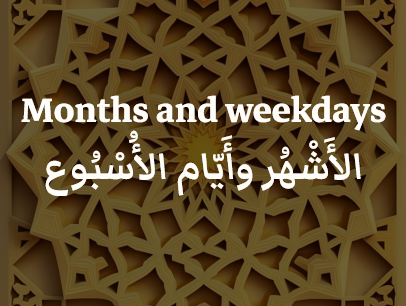Months and weekdays / الأَشْهُر وأَيّام الأُسْبُوع

Months / الأَشْهُر
Understanding the concept of time, including months and calendars, plays a significant role in any language. In Arabic, this knowledge carries deep historical and cultural value.
The fundamental difference between the and Gregorian Hijri calendars lies in their basis. The Gregorian calendar is solar-based, where the duration of a year corresponds to the Earth’s revolution around the sun. This results in approximately 365.25 days in a year, which is why we have a leap year every four years to account for the extra time.
On the other hand, the Hijri calendar is lunar-based. A year corresponds to twelve lunar cycles, resulting in a year that is approximately 11 days shorter than a Gregorian year. Therefore, Islamic dates shift annually in relation to the Gregorian calendar. This difference explains why the month of Ramadan, for instance, occurs at different times in the Gregorian calendar each year.
Hijri calendar / التَقْوِيم الهِجْرِيّ
| Muḥarram (sacred month) | مُحَرَّم (شَهْر حَرام) |
| Ṣafar | صَفَر |
| Rabīʿ al-ʾawwal | رَبِيع الأَوَّل |
| Rabīʿ al-ʾakhīr | رَبِيع الآخِر |
| Jumādā al-ūlā | جُمادى الأُولى |
| Jumādā al-ʾakhīra | جُمادى الآخِرة |
| Rajab (sacred month) | رجب (شَهْر حَرام) |
| Shuʿbān | شُعْبان |
| Ramaḍān | رَمَضان |
| Shawāl | شَوال |
| Dhu al-qiʿda (sacred month) | ذو القِعْدة (شَهْر حَرام) |
| Dhu al-ḥijja (sacred month) | ذو الحِجّة (شَهْر حَرام) |
Note: In the Islamic or Hijri calendar, there are four months that are considered sacred. These months hold a special place in the Islamic faith due to the religious observances that occur during these periods, and because they were considered a time of peace even in pre-Islamic times. The prohibitions against warfare during these months were meant to allow for safe travel and participation in pilgrimage and other religious activities.
Gregorian calendar / التَقْوِيم المِيلاديّ
| English names | Names used in Iraq, Syria, Jordan, Lebanon and Palestine: (Classical Arabic inherited the names from the Babylonian and Hebrew calendars) | Names used in Egypt, Sudan and Eastern Arabia (based on the old Latin names |
|---|---|---|
| January | كَانُون ٱلثَّانِي | يَنايِر |
| February | شُبَاط | فَبْراير |
| March | آذَار | مارِس |
| April | نَيْسَان | أَبْرِيل |
| May | أَيَّار | مايُو |
| June | حَزِيرَان | يُونْيُو |
| July | تَمُّوز | يُولْيُو |
| August | آب | أُغُسْطُس |
| September | أَيْلُول | سِبْتَمْبَر |
| October | تِشْرِين ٱلْأَوَّل | أُكْتُوبَر |
| November | تِشْرِين ٱلثَّانِي | نُوفَمْبَر |
| December | كَانُون ٱلْأَوَّل | دِيسَمْبَر |
Days of the week / أَيّام الأُسْبُوع
Every day of the week is represented by a distinct combination of the word for ‘day’ (يَوْم) and numerical forms, with Friday and Saturday as exceptions that possess their own titles. The term يَوْم may sometimes be omitted from this annexation construction known as إِضافة.
| Sunday | يَوْمُ الأَحَد |
| Monday | يَوْمُ الاِثْنَين |
| Tuesday | يَوْمُ الثُلاثاء |
| Wednesday | يَوْمُ الأَرْبِعاء |
| Thursday | يَوْمُ الخَمِيس |
| Friday (litt. day of the gathering) | يَوْمُ الجُمُعة |
| Saturday | يَوْمُ السَبْت |
Note: In Arabic, the week doesn’t start with Monday but Sunday, being the first day.
Note 2: Friday is called day of the gathering (يَوْم الجُمُعة) in Arabic as it’s the day Muslims are supposed to all gather at the mosque to listen to the imam’s speech and pray the noon prayer together.

Responses